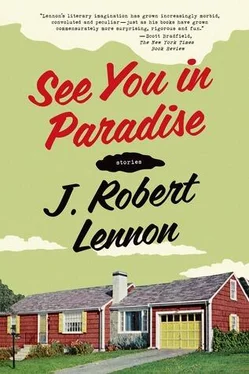Excellent, Mrs. Larsen told us, her papery hands sliding over and under each other with the faint, whisking sound of a busboy’s crumb brush.
What remained unspoken that day, and went largely unspoken even among ourselves, in private, as we waited for Dan to be brought back to life, was that we had pretty much gotten over Dan since the funeral, and could not be said to have greatly missed him. Indeed, by the time Dan reached the age of twenty-five, the year of his death, we had basically had all of Dan we could ever have wanted. He was, in fact, no longer really our friend. The yacht he’d fallen off of belonged to some insufferable blueblood we didn’t know — that was the crowd Dan had taken to running with, the crowd he’d been born into, and all parties concerned had seemed satisfied with the arrangement. Dan’s being dead was no less acceptable to us than his having drifted out of our circle.
But Ruth Larsen didn’t know this, and so we were the ones she called upon in Dan’s time of need. Either that, or the insufferable bluebloods had refused. At any rate, we agreed to do what Mrs. Larsen demanded, and for better or worse he would be our friend once again.

The discovery of the revivification process had resulted, initially, in great controversy. Surely, the naysayers wailed, not everyone who died could be brought back to life. What would separate the haves from the have-nots? Science offered one answer. To be eligible for revivification, you had to die a certain way. Drowning was best. Suffocation. Anything that resulted in a minimum of harm to the body, other than its being dead. Freezing wasn’t too bad, and a gunshot wound, if tidy, could be worked around. Electrocution was pushing it, as was poisoning. Car crash, cancer, decapitation, old age? Right out.
But still, who then? Who among the drowned, the frozen, the asphyxiated, would get to come back?
The rich. Naturally.
Riots had been predicted, the burning of hospitals and medical schools, the overthrow of the government. None of it materialized. The rich had been getting the goodies for millennia — why should that change now? People shrugged and got over it. After all, it wasn’t like the rich could live forever now. They would still die — it was just that now they could get a second chance in certain circumstances. And the rich had always gotten second chances at everything. No, the fact that they could be brought back to life was no big deal, and when you thought about it, not even very surprising.
Besides.
Besides, once the process started becoming commonplace, once people had gotten a look at the revivs, had talked with them, touched them, slept with them, it became clear that, as a general rule, they were a little bit off. You could miss it if you weren’t paying close attention, but they were definitely not quite right. They had, for instance, a way of walking, a kind of sway, an instability. Their hips seemed to ratchet back and forth, like the platen of a typewriter. Their fingers had a habit of twitching or suddenly clenching. Their jaws moved with a bovine circular motion, whether or not they were eating — and when they did eat, they were fussy, often choosing a single item from a varied dish and pushing the rest aside, like children. They had a watery way of speaking and a faraway look in their eyes, but when you asked them, with irritation, if they had heard even a single word you had said, they were able to regurgitate your side of the conversation with pedantic thoroughness, all in a deadpan monotone that made everything you said sound foolish and dull. And they rarely advanced any ideas themselves, no intellectual abstractions, no opinions, not even suggestions for where to eat dinner or what movie to see. They were robust, it seemed, healthy-looking, upright, but passionless — you would never see them jump for joy or raise their voices in anger. They seemed to have a normal sexual response, all the parts worked and if they liked you they would do what you suggested and appear, in some detached way, to get off. But the expected and hoped-for moans, screams, and grunts just did not happen.
Also, they smelled different. A bit spicy. Not at all bad — better, in fact, than regular people. But it was different all the same.
So if you asked a random person from the street whether, if they choked to death on a Jolly Rancher, they would like to be revived, the answer was generally yes. But not an especially enthusiastic yes. “Sure,” accompanied by a shrug, was the common response. By and large, revivification was thought to be something weird rich people did, something along the lines of hymenoplasty, or owning an island. It was impressive, but maybe it wasn’t exactly a great idea.

You weren’t, it turned out, supposed to call revivs revivs. Political correctness dictated that, if you had to refer to them, you should call them restored-life individuals. But, the argument went, since they were not disabled, any specialized term was an insult, and it was best to say something like “Ronald has gotten a second chance at life,” or, “Francine has recovered from her fatal trauma.” Better still to keep mum — to just pretend there was nothing amiss, because really there wasn’t. Everything was totally normal. Calling somebody a reviv was a lie — every person is just a person, and that’s all there is to it.
You were never, in any circumstances, supposed to call them zombies. This was, however, the most commonly employed term.
“My God,” Chloe said, after that first long day at Dan’s bedside. “He’s a fucking zombie.” The six of us were sitting around a table at the closest bar to the hospital, a too-well-lit place with vinyl settees separated by terra-cotta planters full of ferns. The settees were too low for the table, and we had to reach up to get our drinks, which we needed very badly.
As it happened, the meeting at Dan’s mother’s apartment was the first time we’d all been together in many years. Our manner with one another was familiar and weary. As teenagers, we had been inseparable; now we were grown, and had grown apart. Not completely apart, of course. We knew too much about one another for that: the broken homes, the crazy relatives; the dramas of self-discovery, the dirty secrets. The myths we armored ourselves with, out in the world, were worthless here, among people who had witnessed their genesis; and allegiances and estrangements had arisen and retreated among us more times than anyone could count. Chloe and Matt were once an item, as were Chloe and Paul. Rick and Jane had once seemed destined to spend their lives together, but they had broken up, and now Jane had married Matt. Paul and Rick had spent a drunken, carnal week together in a cabin upstate, and now Paul was in a relationship with a man twice his age, a painter from Long Island, and Rick had a girlfriend in Brooklyn. Chloe evidently had a boyfriend — they lived in New Haven — but I had long carried a torch for her, and she and I had managed a few moony glances at each other over the course of the day. I had a good feeling about Chloe. Hearing her call Dan a fucking zombie sent a pleasurable itch across my back. She had always been vulgar.
“I’m afraid you’re right,” Paul groaned.
Matt sighed, shaking his head. “How did we ever get into this mess?”
“It’s my fault,” said Jane, who always blamed herself for everything.
Rick said, “Let’s just tell Ruth to go to hell.”
“Oh, we can’t do that,” I said.
“Fuck, no,” Chloe agreed, offering me a sly glance from the corner of her eye.
The group parted at the subway station. I lived nearby and could walk. Instead of following the others to the trains, Chloe grabbed my hand. “Let’s go to your place.”
Читать дальше













